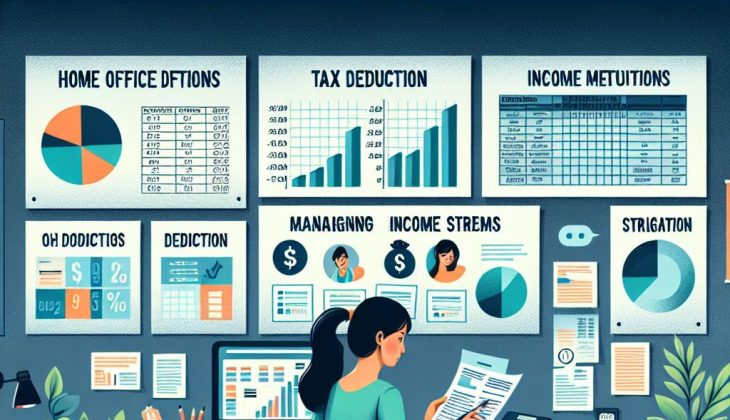Main Points
- If you qualify for the home office deduction, you could save a lot of money. To qualify, you must meet the IRS’s requirements for exclusive and regular use.
- You can calculate your deduction in two main ways: the simplified method and the actual expense method.
- It’s essential to keep accurate records and measure your space correctly to maximize your deduction.
- Common mistakes to avoid include claiming personal spaces and not documenting expenses correctly.
- Technology can help you manage your finances and multiple income streams more efficiently.
What are Home Office Tax Deductions?
Let’s explore home office deductions. If you work from home, you could be eligible for some great tax savings. But there are specific rules from the IRS that you need to follow. Knowing these can help you avoid potential problems.

You can claim the home office deduction if you use a specific area of your home regularly and exclusively for business. This doesn’t mean you can work from your kitchen table every now and then and claim the deduction. You must have a designated area that you use primarily for work. If you meet these criteria, you can deduct expenses such as rent, utilities, and even repairs.
- Exclusive Use: The space must be used only for business activities.
- Regular Use: The space should be used consistently for business purposes.
Basic Requirements for Eligibility
To qualify for the home office deduction, you must meet two basic requirements: exclusive use and regular use. The IRS is strict about these, so it’s important to understand what they mean. Exclusive use means that a portion of your home is used solely for business. You can’t claim the deduction if you also use the space for personal activities.
You must use your home office regularly for your business. This means that it’s not enough to use it every now and then; it must be a normal part of your business operations. If you meet both of these requirements, you can then decide on your deduction method.
What Does Exclusive and Regular Use Mean?
Let’s unpack the idea of exclusive and regular use. Let’s say you have a spare bedroom you’ve transformed into an office. You use this space for meetings, paperwork, and other business operations. This room would likely meet the criteria for the deduction. But if your children use it as a playroom on the weekends, you could run into issues. For more insights on managing your business expenses, check out this quarterly tax filing guide.
It’s crucial to make sure that the space is solely used for your business. Regular use is about how often you use the space. If you only use the space every now and then, it won’t qualify. Being consistent is important. Make sure you consistently use the space for your business to meet the IRS requirements.
Choosing Your Deduction Method
Once you’ve determined that you qualify for a home office deduction, you’ll need to decide which deduction method to use. The IRS provides two options: the simplified method and the actual expense method. Each method has its own advantages and disadvantages, and the right choice will depend on your individual circumstances. For more information on tax-related topics, you might find this guide on maximizing business tax refunds useful.
The easy method lets you subtract $5 per square foot of your home that you use for business, but only up to 300 square feet. This method is simple and doesn’t need as much paperwork. But, it might not give you the biggest deduction.
Using the actual expense method means figuring out the portion of your home you use for your business and applying that percentage to your actual home costs. This way can give you a bigger deduction but it needs very careful record-keeping. For more guidance, check out this quarterly tax filing guide.
Typical Errors to Steer Clear Of
While it’s true that claiming a home office deduction can be a fantastic method to reduce your tax bill, it’s also true that it’s simple to make errors. A frequent mistake is claiming a space that isn’t used solely for business purposes. Keep in mind that the IRS is on the lookout for spaces that are used solely for business purposes.
Another common mistake is not keeping detailed records of your expenses. If you don’t have proper documentation, you could run into problems if you’re audited. Make sure to keep receipts and records of your business activities to back up your deduction claim.
Finally, if you’re an employee working from home, be careful about claiming a deduction. Usually, employees are not eligible for the home office deduction unless they are working from home for their employer’s convenience.
Handling Several Home-Based Income Streams
Handling several home-based income streams is an excellent method to gain financial stability and freedom. By having a variety of income sources, you can safeguard yourself against financial slumps and seize numerous opportunities. However, it necessitates meticulous planning and organization to guarantee everything operates seamlessly.

Working from home offers the freedom to pursue various income streams. This could be freelancing, starting a side hustle, or investing in stocks. Each stream can help you reach your financial goals. The trick is to manage them well so you don’t feel overwhelmed and to make sure you’re getting the most from your earnings.
Advantages of Multiple Income Streams
Having a variety of income streams has many advantages. The most important is that it gives you a backup plan. If one stream stops, you have others to fall back on. This lowers your financial risk and can result in a more consistent income overall.
Moreover, having more than one source of income can speed up your journey to financial freedom. With more income, you can pay off your debts quicker, save more money, and invest in future opportunities. It also gives you the chance to pursue your passions and turn your hobbies into money-making ventures.
Effectively Monitoring Your Revenue and Costs
When you’re juggling multiple income streams, it’s important to keep an eye on your earnings and expenses. This allows you to see exactly what’s bringing in money and what’s costing you. It can also show you which streams are bringing in the most money and where you might need to tweak things. For additional tips, check out this quarterly tax filing guide to manage your finances better.
Keep detailed records using tools such as spreadsheets or financial apps. Organize your income by its source and monitor your expenses to see how they match up with your earnings. Regularly looking over these records can assist you in making knowledgeable choices and fine-tuning your financial plan.
Financial Organization Advice
Keeping everything in order is the secret to successfully managing multiple income streams. Here are some suggestions to help you keep track of your money, including strategies to maximize business tax refunds:
- Create a Budget: Outline your income and expenses to ensure you’re living within your means.
- Set Financial Goals: Define clear objectives for your income streams and track your progress.
- Use Financial Software: Consider using accounting software to automate tracking and reporting.
- Schedule Regular Reviews: Set aside time each month to review your financial situation and make necessary adjustments.
Example: Jane manages her freelancing work, a small online store, and rental income from a property. She uses a spreadsheet to track each income source and its associated expenses. By doing so, she can see which stream is performing best and where she needs to focus her efforts.
When you apply these strategies, you’ll be more prepared to manage the intricacies of handling multiple income streams, and you’ll be one step closer to achieving financial independence.
How to Manage Your Finances Effectively
Managing finances can be challenging when you have multiple income streams. However, with the right strategies, such as understanding small business tax credit services, you can keep your finances organized and ensure you’re making the most of your earning potential.
Creating a Budget for Your Home Office
Keeping track of your business expenses and maximizing your home office deduction is easier with a home office budget. Begin by identifying all possible expenses, like utilities, internet, office supplies, and any costs that are unique to your income streams.
After you’ve figured out what your expenses are, designate a chunk of your income to cover these costs. This is a good way to keep on top of your finances and make sure you have the money you need to keep your home office going.
Leveraging Technology for Financial Management
Technology can revolutionize the way you manage your finances. There are countless apps and software out there that make income and expense tracking a breeze.
Think about using software like QuickBooks, Mint, or YNAB to automate your financial tracking. These platforms let you categorize transactions, set budgets, and generate reports to give you a clear overview of your financial situation.
- QuickBooks: This is perfect for small business owners and freelancers because it offers a complete range of accounting features.
- Mint: This is a free app that assists you in managing your personal finances and tracking your spending.
- YNAB (You Need A Budget): This is a budgeting tool that focuses on helping you use your money effectively.
The Tax Consequences of Multiple Income Sources
Managing multiple income streams can have tax implications that you need to be aware of. Each income source may have different tax rules, and it’s important to understand how they affect your overall tax liability.
- Accurately report your taxes by keeping detailed records of all your income and expenses.
- Consider getting a tax professional to help you navigate the complexities of having multiple income streams.
- Know the tax implications of each income source, such as self-employment taxes for freelance work.
By staying informed and organized, you can manage the tax implications of your income streams effectively and avoid any surprises come tax season.
Typical Problems and Their Answers
Overseeing different revenue streams can be a boon, but it also has its own difficulties. Being ready and understanding how to handle these problems can have a substantial effect on your financial path.
Managing IRS Audits and Inquiries
One of the issues with claiming a home office deduction and managing multiple income streams is the potential for an IRS audit. To reduce this risk, make sure that all your records are precise and current.
It’s critical to maintain thorough records of your earnings, expenditures, and business operations. If you’re ever audited, having your paperwork in order will make the procedure go more smoothly and prove your adherence to IRS rules.
Maintaining a Work-Life Balance
The line between work and personal life can get blurry when you work from home. It’s crucial to set boundaries to keep a healthy balance. Set aside a specific area in your home for work, and aim to keep regular working hours.
Talk to your family about your work hours and space requirements. By setting clear boundaries, you can create a workspace that is productive and still have time for your personal life.
Don’t forget, the secret to successfully handling various income streams and taking home office deductions is being organized and diligent. By sticking to these strategies and staying educated, you can attain financial independence and reap the rewards of working from home.
Keeping Up with the Latest Tax Law Amendments
As tax laws are always changing, it is important for those managing a home office or multiple income streams to stay current with these changes. Being familiar with the most recent tax laws means that you can maximize your deductions and avoid any potential issues.
It’s important to stay up-to-date with changes in tax laws. You can do this by subscribing to newsletters from the IRS, attending tax seminars, or consulting with a tax professional. These resources can provide valuable insights and updates on new tax policies that may affect your financial situation.
For instance, in 2020, the IRS rolled out a streamlined home office deduction method. This made it much simpler for taxpayers to claim deductions without having to keep detailed records. By staying up-to-date with these types of changes, you can ensure that your tax strategy is as effective as possible.
Furthermore, keeping up to date with changes in tax laws can assist you in making knowledgeable choices about your financial management and guarantee that you are following IRS rules.
Conclusion: Making Money from Home
It’s completely possible to make money from home if you have the right strategies and mindset. If you understand the details of home office deductions, how to manage multiple income streams, and keep up-to-date on changes in tax law, you can improve your financial situation and work towards financial freedom.
Summary of Main Ideas and Final Suggestions
In summary, first make sure your home office fits the IRS criteria for exclusive and regular use. Choose the deduction method that works best for you, whether it’s the simplified or actual expense method. Keep detailed records of your expenses and use technology to make financial tracking easier.
By diversifying your income sources, keeping a close eye on your finances, and setting specific financial goals, you can effectively manage multiple streams of income. Stay up-to-date on changes to tax laws to ensure you’re getting the most out of your deductions and staying in line with IRS rules.
These strategies will set you on the path to financial success, all from the comfort of your home.
Common Questions
Many individuals have queries about home office deductions and managing income streams. Here are some typical questions and their responses:
How much of my home can I dedicate to a home office?
The amount of your home you can dedicate to a home office is contingent on the space you have set aside for business operations. To figure out the percentage, measure the square footage of your office and divide it by the total square footage of your home.
How do I decide between the simplified and actual expense methods?
Take into account the size of your home office and the intricacy of your expenses. The simplified method is simpler and requires fewer documents, while the actual expense method might lead to a bigger deduction if you have substantial home-related expenses.
Am I eligible for a home office deduction if I rent my home?
Absolutely, renters can take advantage of the home office deduction as long as they meet the criteria set by the IRS for exclusive and regular use. This allows you to deduct a portion of your rent, utilities, and other expenses related to your home office.
What documentation should I have to back up my home office deduction?
Keep meticulous records of your home office expenses. This includes receipts, utility bills, and any other paperwork that can substantiate your deduction. Also, keep track of your business activities and how you use the space. For more tips on maximizing your deductions, explore these strategies and tips.
What can I do to prevent an IRS audit when I claim a home office deduction?
To prevent an audit, make sure your home office meets the IRS requirements for exclusive and regular use. Keep detailed records of your expenses and be honest in your deduction claims. If you’re unsure, consult a tax professional for guidance.
- Make sure you only use your home office for business purposes.
- Keep a detailed record of all expenses related to your home office.
- Stay updated with the latest IRS rules and regulations.
What are some tips for managing multiple income streams from a home office?
Use financial software to keep track of your income and expenses, set financial goals, and regularly review your financial situation. Diversify your income sources to reduce risk and increase your earning potential. For more guidance, check out this quarterly tax filing guide to help manage your finances effectively.
What expenses can I usually deduct?
Typical expenses that you can deduct include a percentage of your rent or mortgage, utilities, internet, office supplies, and home office repairs. Be sure to keep detailed records of these expenses to back up your deduction claim.

